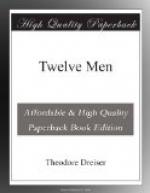In the room there might be three or four girls—sisters, sweethearts, pals of one or other of the players—some dancing, some playing the piano or singing, and in addition the landlord and his wife, a slattern pair usually, about whose past and present lives Peter seemed always to know much. He had seduced them all apparently into a kind of rakish camaraderie which was literally amazing to behold. It thrilled, fascinated, at times frightened me, so thin and inadequate and inefficient seemed my own point of view and appetite for life. He was vigorous, charitable, pagan, gay, full of health and strength. He would play at something, anything, indoors or out as occasion offered, until he was fairly perspiring, when, throwing down whatever implement he had in hand—be it cards, a tennis-racket, a golf club—would declare, “That’s enough! That’s enough! I’m done now. I’ve licked-cha,” or “I’m licked. No more. Not another round. Come on, Dreiser, I know just the place for us—” and then descanting on a steak or fish planked, or some new method of serving corn or sweet potatoes or tomatoes, he would lead the way somewhere to a favorite “rat’s killer,” as he used to say, or grill or Chinese den, and order enough for four or five, unless stopped. As he walked, and he always preferred to walk, the latest political row or scandal, the latest discovery, tragedy or art topic would get his keen attention. In his presence the whole world used to look different to me, more colorful, more hopeful, more gay. Doors seemed to open; in imagination I saw the interiors of a thousand realms—homes, factories, laboratories, dens, resorts of pleasure. During his day such figures as McKinley, Roosevelt, Hanna, Rockefeller, Rogers, Morgan, Peary, Harriman were abroad and active, and their mental states and points of view and interests—and sincerities and insincerities—were the subject of his wholly brilliant analysis. He rather admired the clever opportunist, I think, so long as he was not mean in view or petty, yet he scorned and even despised the commercial viewpoint or trade reactions of a man like McKinley. Rulers ought to be above mere commercialism. Once when I asked him why he disliked McKinley so much he replied laconically, “The voice is the voice of McKinley, but the hands—are the hands of Hanna.” Roosevelt seemed to amuse him always, to be a delightful if ridiculous and self-interested “grandstander,” as he always said, “always looking out for Teddy, you bet,” but good for the country, inspiring it with visions. Rockefeller was wholly admirable as a force driving the country on to autocracy, oligarchy, possibly revolution. Ditto Hanna, ditto Morgan, ditto Harriman, ditto Rogers, unless checked. Peary might have, and again might not have, discovered the North Pole. He refused to judge. Old “Doc” Cook, the pseudo discoverer, who appeared very shortly before he died, only drew forth chuckles of delight. “My God, the gall, the nerve! And that wreath of roses the Danes put around his neck! It’s colossal, Dreiser. It’s grand. Munchausen, Cook, Gulliver, Marco Polo—they’ll live forever, or ought to!”




